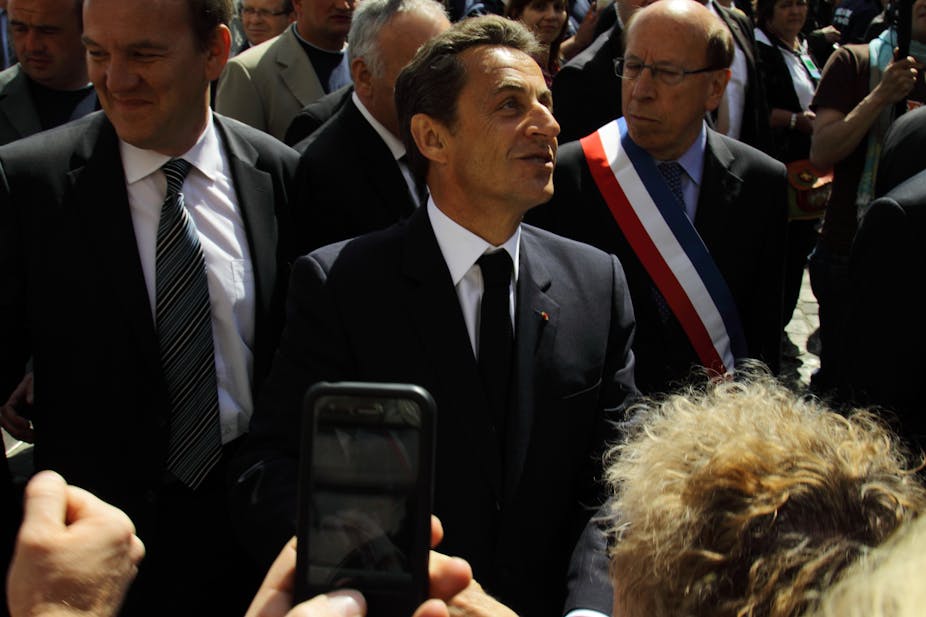Nicolas Sarkozy has returned to mainstream French politics by announcing his plan to run for the leadership of the main opposition party, the centre-right UMP. He faces tough opposition from within his own party, and he has yet to fully shake off the spectres of his past. But if he can show that things will be different this time around, his comeback might just work.
In May 2012, in the aftermath of his defeat in the presidential elections, Sarkozy made a gracious and humble speech to his UMP campaign team that was watched by the nation. He told his weeping supporters that responsibility for the defeat was his, and all the effort theirs. At the very end, he said “I love you” – and those supporters have been loving him back ever since.
During the 2012 campaign, Sarkozy said that if he lost he would leave politics. Now as he makes his return, many will seek to remind him of that pledge. But in fact, he never really left.
His close supporters and advisers have been looking after his interests in the UMP, although they didn’t have to do that much, given the party has been riven with internal divisions and no clear leader ever emerged to succeed him.
The three former prime ministers in his party – Alain Juppé, Jean-Pierre Raffarin, and François Fillon – have been trying their best to stop him from returning though, so Sarkozy and his team decided that they had to go for the (vacant) leadership of the UMP if he is to be the right’s presidential candidate in 2017.
He has, of course, also been helped by the catastrophic unpopularity of president François Hollande and the chaotic Socialist government. The growing public deficit, absence of growth and rocketing unemployment haven’t done his cause any harm either.
Sarkozy himself has been tangled up in a range of scandals. Most are financial and all are very serious, although none of them are proven. Becoming the official leader of the opposition may take some of the heat off him, particularly given that he then has the chance to become president again.
His intention was to come back as the “providential man”, just like Charles de Gaulle in 1958. Whether France actually needs Nicolas Sarkozy as much as some think it needed de Gaulle is debatable, but his comeback points to a deep French tradition: a powerful belief in heroes.
“It’s me or chaos” de Gaulle once said; and it is true that 2014 has some of the atmosphere of a regime crisis.
Hollande has failed spectacularly to be a hero. During his presidency, the far-right Front National has risen and risen, securing 25% of the vote at the 2014 European elections when the Socialists won just 13.8%. A poll in mid-September also suggested Le Pen would actually beat François Hollande in 2017 if they both went through to round two of the presidential election. Both the mainstream left and right need a strong leader to fend off this threat.
Jumping the gun?
The problem is that a party leader can lose his providential status quite easily in the daily politics of partisan conflict. And Sarkozy has perhaps come back too soon to really put himself above the fray.
The much-respected Bernadette Chirac implied just this when she said that to win in 2017, Sarkozy should not try and take the leadership of the party but wait for the country to turn to him in its hour of need.
That, though, is probably an even riskier strategy. Even if he does avoid the daggers of party rivals, Sarkozy is actually not as well liked outside the party faithful as his rival Juppé. The general public still remember him as the “bling-bling president”, and he needs to display a convincingly different character to the one that lost him the last election. And if he cannot show he has changed, he must at least show he has learned.
If he hasn’t, the risk is that his star will not rise, and the next two years will be even more chaotic than the last. Sarkozy knows that he lost his hero status last time, but if he can prove himself a worthy leader, many of the conditions are right for his return. Even if providentialism is just a myth, leadership is sorely lacking in the French case.

